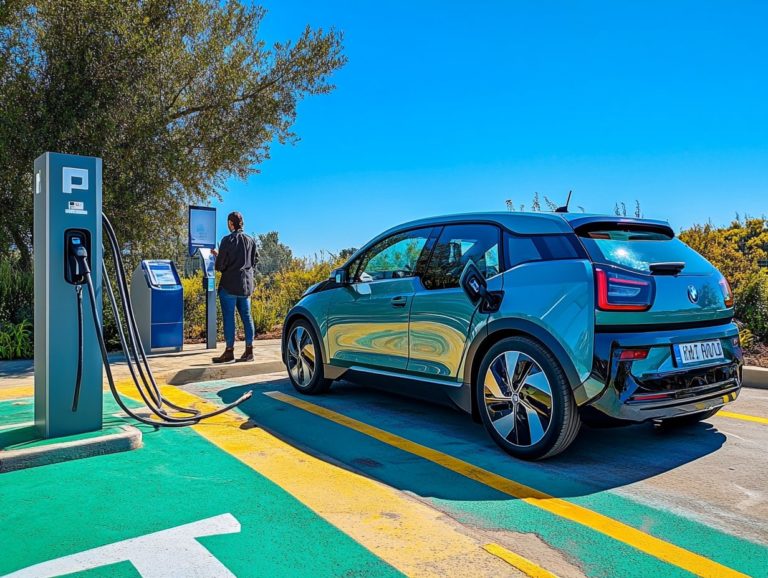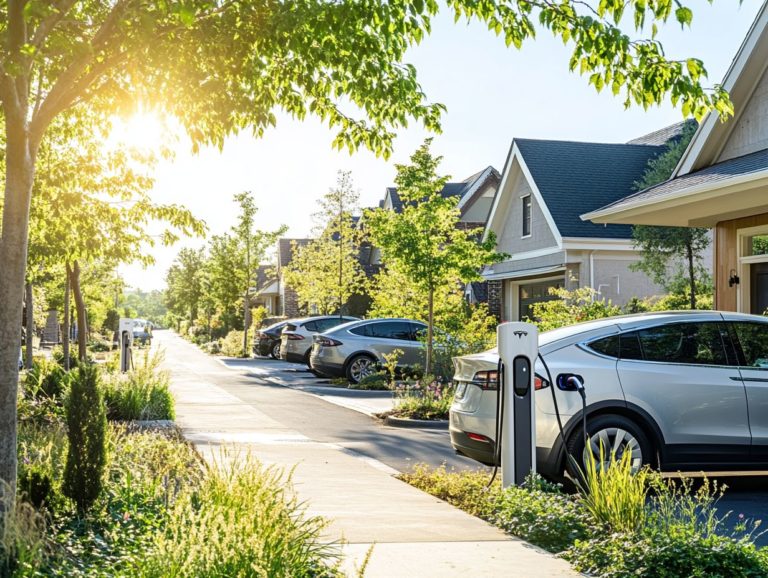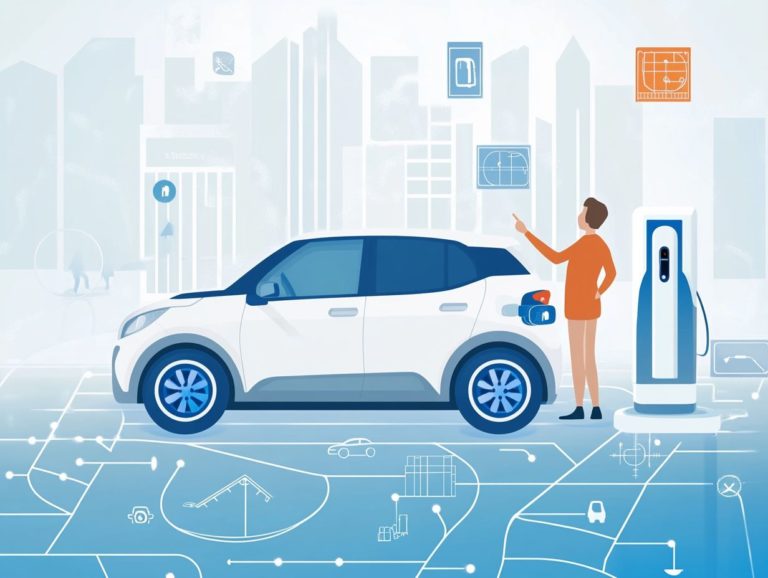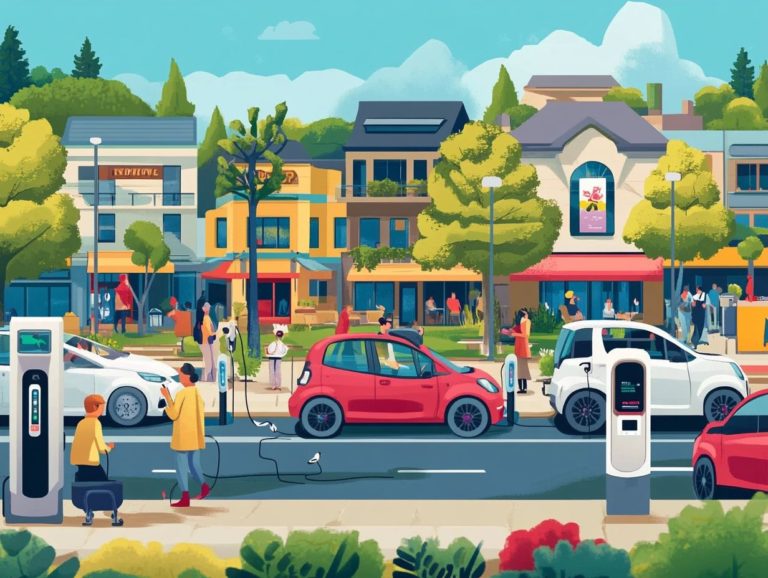How Do Electric Cars Impact Air Quality?
The world is racing toward sustainable transportation, and electric cars are leading the charge in the battle against air pollution and climate change.
This article delves into what electric cars are and showcases their environmental benefits alongside the challenges they encounter. You’ll discover how their emissions stack up against traditional vehicles, revealing the genuine impact on air quality.
The article also looks at the future of electric cars and the potential for ongoing advancements. Engage with us to grasp the vital role electric cars play in fostering a cleaner, healthier planet.
Contents
Key Takeaways:

- Electric cars significantly reduce air pollution by emitting zero tailpipe emissions.
- The production of electric car batteries has a lower environmental impact compared to the production of traditional gas engines.
- Improving infrastructure and battery technology will further enhance the environmental benefits of electric cars in the future.
Overview of Electric Cars
Electric cars, or electric vehicles (EVs), represent a major change in how we travel, harnessing electric power rather than relying on traditional gas engines.
By utilizing renewable energy sources, these vehicles play a pivotal role in reducing pollution and advancing climate objectives.
With their electric motors, you benefit from zero-tailpipe emissions while enjoying cutting-edge technologies like regenerative braking, a technology that helps recharge the battery while slowing down. As the global electric vehicle market expands, it paves the way for greater adoption, making EVs a fundamental component of contemporary clean energy strategies.
What are Electric Cars?
Electric cars are vehicles that run on electric motors, drawing power from batteries rather than traditional gas engines.
These remarkable machines thrive on the synergy between their sophisticated battery systems, which store energy efficiently, and the robust electric motors that offer a smooth and responsive driving experience.
The evolving charging infrastructure is essential in enhancing the accessibility of electric vehicles, enabling quicker charging times and broader availability.
The benefits of electric cars extend beyond mere convenience; they include reduced operational costs and a significant drop in harmful emissions, ultimately contributing to improved air quality in urban environments.
As cities worldwide embrace environmental programs, your transition to electric mobility is becoming increasingly crucial for sustainable development.
Environmental Benefits of Electric Cars
The environmental benefits of electric cars are truly remarkable. They make a substantial difference in air quality and significantly cut down greenhouse gas emissions when stacked against conventional vehicles.
By harnessing renewable energy sources and championing clean energy in the electricity sector, electric vehicles play a crucial role in reducing carbon pollution.
Embracing the shift toward electric vehicle adoption not only curbs pollution but also enhances air quality, especially in urban areas plagued by heavy traffic and elevated levels of air pollutants.
Reducing Air Pollution
Electric vehicles play a pivotal role in reducing air pollution by significantly minimizing harmful emissions, such as nitrogen oxides and particulate matter, which are often rampant in urban areas.
These vehicles are thoughtfully designed to operate with far lower emissions compared to conventional gasoline-powered cars. This distinction is especially critical in densely populated cities, where air quality frequently suffers.
Take Los Angeles as an example: as the adoption of electric vehicles has surged, there’s been a remarkable decline in smog levels, illustrating the clear benefits of cleaner transportation options.
City policies that champion electric vehicle usage like incentives and expanded charging infrastructure have effectively encouraged residents to embrace this shift. Consequently, cities that prioritize electric vehicles not only improve their air quality but also foster a healthier environment for their communities.
Join the electric vehicle revolution today and help create a cleaner, brighter tomorrow!
Lowering Greenhouse Gas Emissions

By transitioning from conventional vehicles to electric cars, you can play a significant role in lowering greenhouse gas emissions and addressing carbon pollution. This supports efforts to mitigate climate change.
The reduction in emissions largely comes from the efficiency of electric motors and the opportunity to power these vehicles with renewable energy sources. Research indicates that when electric vehicles (EVs) are charged with solar, wind, or hydroelectric power, they produce substantially fewer emissions compared to gasoline or diesel vehicles.
A recent study by the International Council on Clean Transportation highlights that the lifecycle emissions of EVs can be up to 70% lower than those of traditional vehicles, depending on the electricity mix. This underscores the importance of enhancing the electricity sector by integrating renewables, maximizing the environmental benefits of electric vehicles, and paving the way for a sustainable energy future.
Challenges with Electric Cars
Despite the many advantages of electric cars, several challenges may hinder their widespread adoption. Key issues such as infrastructure limitations and range anxiety can significantly impact usability. It is essential to navigate these hurdles for a seamless driving experience.
Infrastructure and Range Limitations
Infrastructure and range limitations are significant barriers on your journey toward electric vehicle adoption, often leading to feelings of range anxiety.
The problem worsens with the noticeable scarcity of charging stations, especially in rural areas, which can discourage potential drivers. Recent studies reveal that regions with a robust charging network experience up to 30% higher electric vehicle (EV) adoption rates compared to those with limited access.
The International Energy Agency reports that achieving zero-emission objectives necessitates an eight-fold increase in global charging infrastructure by 2030. Expanding these networks is crucial to hasten the shift toward a more comprehensive electrification of transportation.
Environmental Impact of Battery Production
The environmental impact of battery production for electric vehicles is a pressing concern, particularly regarding resource extraction and disposal. Therefore, battery recycling must be a priority in the EV landscape.
As demand for electric vehicles surges, the challenges surrounding the mining of lithium, cobalt, and nickel become increasingly evident. These activities often lead to habitat destruction, water depletion, and pollution issues that cannot be ignored.
Alongside these extraction hurdles, managing battery waste poses a significant threat. Discarded batteries can leach hazardous substances into the environment, causing widespread harm.
Fortunately, advancements in battery recycling technologies are emerging as a beacon of hope. Innovations are enabling the recovery of valuable materials and significantly reducing overall waste. Robust electric vehicle policies are also forming, encouraging sustainable practices and fostering a circular economy, a system aimed at minimizing waste and making the most of resources. By doing so, they work to lessen the ecological footprint of the rapidly expanding EV industry.
Comparing Electric Cars to Traditional Cars
When comparing electric cars to traditional vehicles, it’s crucial to assess their overall environmental impact. This includes not only the emissions generated during operation but also throughout the manufacturing process.
We must act quickly to improve recycling technologies and bolster the adoption of electric vehicles. For more information on electric vehicles, consider joining an advocacy group to stay informed and engaged.
Emissions and Overall Environmental Impact

Electric vehicles are changing the way we think about transportation and the environment! They offer a remarkable advantage when it comes to emissions, producing significantly lower levels compared to conventional vehicles. This is largely due to their reliance on electric motors and clean energy sources.
When considering the substantial greenhouse gases emitted by traditional gasoline and diesel vehicles releasing carbon dioxide and other harmful pollutants during combustion the benefits of electric vehicles become even clearer. Recent advancements in electric motor technology have enhanced efficiency, allowing for better use of renewable energy sources from the grid.
As cleaner energy options like wind and solar become more prevalent in the electric grid, the lifecycle emissions of electric vehicles continue to decline. This trend makes them an increasingly appealing choice for those who prioritize environmental sustainability.
Future Outlook for Electric Cars and Air Quality
The future outlook for electric cars is exceptionally promising, especially when it comes to enhancing air quality and meeting the ambitious climate goals established by nations around the globe.
Potential for Further Improvements
With continuous advancements in exciting innovations, the potential for enhancing the impact of electric vehicles and reducing emissions is truly remarkable.
This evolution invites you to discover new technologies like solid-state batteries, a new type of battery that is safer and more efficient, offering higher energy densities and faster charging times that revolutionize your driving experience.
Advancements in energy management systems optimize battery usage, significantly extending the range of electric vehicles. As these vehicles gain traction, integrating renewable energy sources, such as solar and wind, into the electric grid can drastically decrease both your carbon footprint and reliance on fossil fuels.
These synergies boost the sustainability of electric transportation while creating a pathway for a cleaner, more efficient energy ecosystem, which redefines your perspective on mobility in a world increasingly focused on environmental performance.
Frequently Asked Questions
What is the impact of electric cars on air quality?
Electric cars produce zero emissions, meaning they have a significantly positive impact on air quality compared to traditional gasoline-powered cars. To learn more about their advantages, check out the environmental benefits of EVs.
How do electric cars reduce air pollution?

By using electricity as a fuel source, electric cars do not emit harmful pollutants such as carbon monoxide, nitrogen oxides, and particulate matter, greatly reducing air pollution levels.
Do electric cars contribute to smog?
No, electric cars do not contribute to smog as they do not release any pollutants that can react with other chemicals in the atmosphere to form smog.
Do electric cars have any impact on climate change?
Electric cars play a role in reducing greenhouse gas emissions, which contribute to climate change. By using renewable sources of electricity, the impact of electric cars on climate change can be further reduced.
How do electric cars compare to gasoline cars in terms of air quality?
Electric cars have a significantly lower impact on air quality compared to gasoline cars. According to a study by the Union of Concerned Scientists, electric cars emit about 50% less global warming pollution than gasoline cars over their lifetime, highlighting the impact of EVs on urban air quality.
Are there any potential downsides to electric cars when it comes to air quality?
While electric cars themselves do not produce emissions, the electricity used to charge them may come from power plants that emit pollutants. However, as more renewable energy sources are being used, this impact is decreasing.
Explore how electric vehicles can transform your commute today!






